In a Scottish textile factory, one heckler reads aloud the daily news while his coworkers prep the days hemp fibers for spinning.
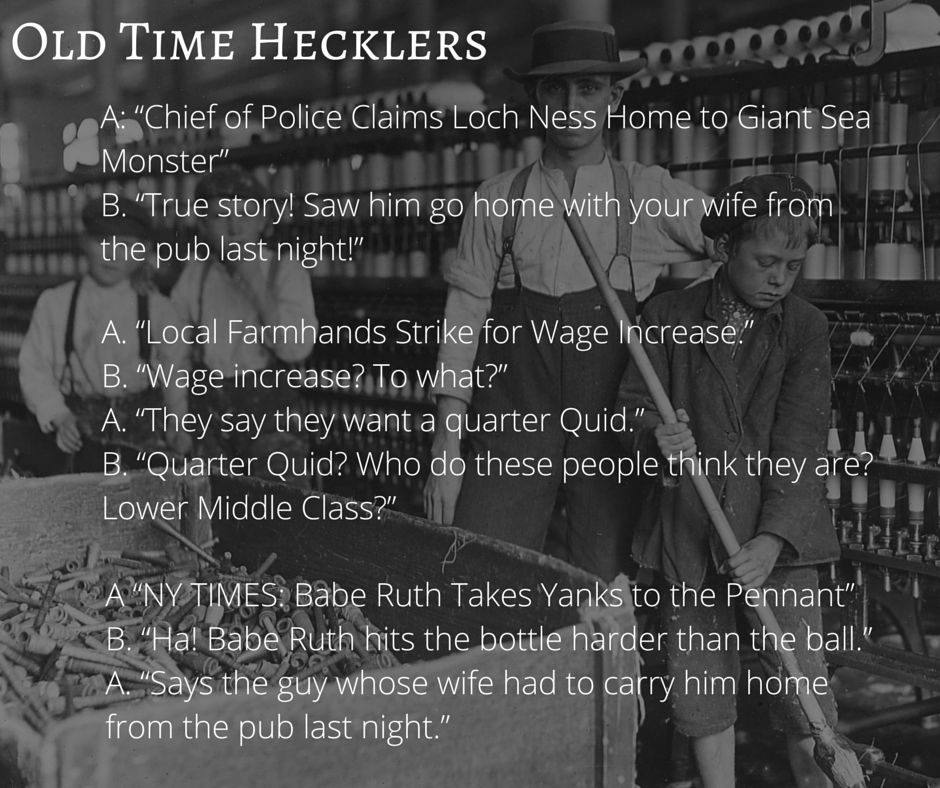
The banter rolls on into the morning hours at the start of each day. One man reading the news with an accompaniment of working stiffs interrupting, insulting, cracking jokes and debating with choler. Each worker feeling proud, having input their 2 shillings into current events in a time when “heckling” meant to split and straighten hemp or flax fibers to ultimately make things like clothing, upholstery and bedding.
Because of the shenanigans of these “Hecklers” in the early 1900s Scottish textile industry, the word has come to take on the meaning that most people use today.
Embarrass. Harass. Annoy. — Gibe?
I’m starting to think the Hecklers of yore were not well-liked people and perhaps outside of their community, that may have been true. But why continue to take the spotlight in front of your colleagues with the daily news, knowing full-well you’re about to be — Embarrassed? Harassed? Annoyed? Perhaps it’s time we connect this word back to its origins and give its definition a reboot. After all, if we’re still using words like “gibe” in definitions, a word that had its heyday in the 30’s and is invariably gone from present-day American English, perhaps it’s a sign that it’s time.
In this writing, we’ll be exploring various types of heckling, some of which you may have heard or even done yourself and maybe some that you’ve never taken a moment to consider, be grateful for or be amazed by. We’ll hear perspectives from comedians, jugglers and hecklers themselves on what Heckling means to them.
Why do people heckle?
After watching Jamie Kennedy’s 2007 Film, Heckler, documenting the experiences and opinions of stand-up comedians on hecklers, there seemed to be one very clear pattern: hecklers are not welcome at a comedy club. The majority of professional comedians seem to consider hecklers to be disruptive and rude, reducing the overall quality of their prepared act.
But there are a few, a minority, who tap into something altogether different. People like Harland Williams, stand-up comedian and actor in movies like Dumb and Dumber, Half Baked and Freddy Got Fingered who said:
Harland sees heckling as a challenge. And perhaps that’s why many on-stage performers hate hecklers the most— Hecklers challenge the the spotlit.Challenge them to reframe their punchlines, to reconsider their strategy, to change their act from perfectly-written to improv-from-necessity.
“Everybody has a plan until they get punched in the mouth.”
“A heckler is somebody who is wanting to get in on the action”
says Mike White, writer and producer of Nacho Libre. And who’s to disagree? But who’s to say that the spotlight can’t be shared? Who’s to say that hecklers can’t be performers themselves, adding to a spotlit piece in unexpected, yet hilarious ways?
Welcome to the world of Renegade culture, where audience members are invited to willingly participate as hecklers during stage acts in hopes that the audience themselves become an integral part of the show’s merry-making. Where jugglers, musicians, dancers, and comics gather to perform “Renegade Acts” to shock, amaze and slay the crowd in exchange for a shot of hard liquor and a genuine round of applause that is earned rather than given out of polite company’s sake. When the act is done, the performers take their bows and return to the audience, looking to participate from the sidelines in other people’s acts in a large cast of supporting characters.
Let me just get this out of the way so we have some perspective going forward:
And with every art, comes critics. Critics like your writer and host, Kai Sosceles. Not here to call out individuals, just bad heckling. Bad heckling doesn’t automatically make you a douchebag as Joe Rogan would have you believe from his commentary in Heckler, but plenty of douchebags are bad audience members and who wants to take the time to sort it out when your career is the one in the spotlight? Understandable. With that said, let me point out the first bit of audience commentary that the Heckling culture boos.
Obscenities.
In the culture of Heckling, these are the lowest of the low. Meow don’t mistake this for the lewd or vulgar, as even those have their place in Heckling. I once heard a call for a “Stunt cock” as a beautiful male/female duo took the Renegade Stage…laughed my ass off. Bigups Alien-Jon. But Obscenities are the value-decreased, mindless criticisms that dribble out of morons mouths as their shark-like attentiveness sniffs a drip of blood in the water. 
These are essentially the equivalent of “your mom!” comebacks of childhood, except no one is insulting these audience members (not even going to call them Hecklers at this point). If the entire crowd wasn’t already aware of how much of a jackass this person is, they’ve just gone out of their way to make it known. At first I wrote that Obscenities are “worthless,” but I erased it because this type of audience feedback actually takes away from the show. It is not valued at 0. At neutral. It is detrimental to the act. These people fight against the possibility of an entertaining show. Please don’t be this person.
And now to break up the monotony with Bill Hicks famously slamming an Obscene crowd member:
[fusion_builder_container hundred_percent=”yes” overflow=”visible”][fusion_builder_row][fusion_builder_column type=”1_1″ background_position=”left top” background_color=”” border_size=”” border_color=”” border_style=”solid” spacing=”yes” background_image=”” background_repeat=”no-repeat” padding=”” margin_top=”0px” margin_bottom=”0px” class=”” id=”” animation_type=”” animation_speed=”0.3″ animation_direction=”left” hide_on_mobile=”no” center_content=”no” min_height=”none”]A little intense? Perhaps. If Harland sees heckling as bullets fired, comedian Bill Hicks watches this bullet whiz by and returns with a Super Soaker 9000 filled with sulfuric vitriol. Remember, if you want to be a heckler, you need to prepared to be heckled back by working professionals.
Let’s move on to the Obscene’s 2nd cousin by law.
Clothing Removal
Some people might consider “Show us your tits!” to fall into the category of Obscenity, and I would have to agree. However, it seems that some have yet to realize that their never-clever shouts of “Take off your pants!” are based in the same premise. Mind you! “Take off your pants!” has validity in an act after a performer makes multiple failed attempts at a trick, but still wishes to continue. In these instances, they must provide something of value if they wish to remain on stage. Nudity is considered valuable to most crowds so take your pants off or stop wasting people’s time. But if you’re new to this heckling thing and you just want in on the action for no other reason than to hear your own voice — take a deep breath, count to 10, and pull your head out of your ass. You are not adding anything to this performance. Maybe take your own clothes off and go perform. Then you’re at least adding novelty. Until then — Lurk, Listen, Learn.
Jeeze Kai…why you gotta take all the fun out of heckling? If the above-mentioned are so terrible, what do you recommend?
Well, I’m glad you asked. (You were asking that in your heads, right?)
Here are some basics and by no means the most inventive, but a place to begin analyzing what it means to Heckle in a positive and/or additive way.
Again, With Less Suck
Every person with a spotlight on them in history has faltered. Stumbled. Stuttered. Even the most practiced slip up from time to time. And in those moments, audience members have some decision making to do. A crowd can choose to overlook an error, maliciously call out an error, or recognize that the performer is a god damn human being putting themselves, their emotions and experiences, their art, on public display and that’s fucking hard. Recognize that seeing someone succeed, even with help, is a more noble act of humanity than the addition of obstacles to push someone towards failure for a cheap and selfish one-time laugh at the expense of another.
So what do we Hecklers tell those who have wavered? We shout…
“AGAIN! WITH LESS SUCK!”
We encourage 2nd chances. We want to see you succeed. We recognize your failure and grant another opportunity, free of judgement, for you to try and amaze us with success.
Give these chances. Take these chances.
,But Can You…?
More often than not in my experience, those who are welcome on stage or in spot have been invited because they were deserving of it. Some stakeholder along the way said “You. I think you belong here.” Sometimes the light itself is the one who says these words, as in the case of Fire Spinning, where the flame is simultaneously the spot and the maker of fools, beckoning to be treated with respect lest ye’ wish to be burned. Ain’t no heckle worst than a hot chain of fire wrapping around your body.
But in those times of deservingly showing our stuff, killin’ it, being in the zone, slaying or being “on fire” (metaphorically speaking), sometimes we get a little cocky. A little…overzealous. Sometimes we think we’re the best. And in those times, “,But Can You?” is both a nice reminder that we still have room to grow and the encouragement to break out of one’s comfort zone, put it all on the line, and just go for it!
The comma in front of “But” acknowledges that a feat has been performed successfully, while the rest of the statement suggests the next step of excellence for the performer to achieve greater heights. Again, this is an audience driven feedback mechanism to let the performer know that we are giving them a judgement-free shot at the next-level of improving their game.
You can see one of these games in action in the commentary of the Heckling discussion happening on my Facebook page where even the status itself turned into a game of Heckling. See if you can spot it and add me as a friend while you’re there. 🙂
Do That One Thing!
Bad audience members (ahem, not hecklers, just douchebags) often try to turn the performer into their own personal puppet. Maybe they saw the performer do a great bit once and they’re determined to see it live regardless of the plans of the person on stage. Maybe they’re trying to look clever by knowing future content before it’s put on display. Regardless of motivations, hecklers boo these people. It’s one thing to offer a suggestion, perhaps in the event that you’re asked for one (as in Improv Comedy), but to command from the sidelines and possibly ruin surprises is just selfish. An example might a person who knows the final bit of an act and shouts it out in the middle of the performance. Dick move, not additive.
And like a smack to the brain, the performer has been de-clicked from their usual alignments. They quickly think “What one thing?” and in that moment, recall something new and fresh or beautiful and classic that they had seemingly forgotten to perform. And then, Boom. It gets laid out and the audience goes wild. Another great moment of joy for all down in the books, tactfully guided by the supporting roles of the heckling audience members.
Where do we go from here? How do we be better hecklers? How do we silence or play with those who are heckling us?
As always — Lurk, Listen, Learn. Attend stand-up shows and street performances and take notes on how professionals retain control over their crowds. Read a book on and/or take a class on Improv Comedy to study the game formations that are used to generate laughs on the spot. Hit up your local FAI Retreat and sit-in on the Renegade shows. Listen to the techniques people use. Punchline setups. Game Heightening. Time Dashing. There’s all kinds of “tech” to be learned and played with for Hecklers. Study up.
And of course — PRACTICE. PRACTICE. PRACTICE.
If you got this far, you might be interested in some of my other writings over on Medium.com. And duh…go like my Facebook page because social media numbers are indicative of success in these strange times.
[/fusion_builder_column][/fusion_builder_row][/fusion_builder_container]

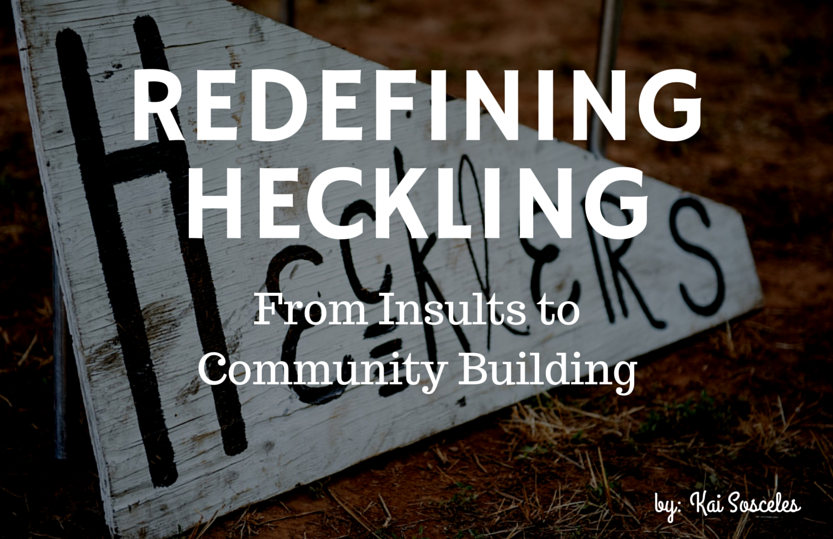
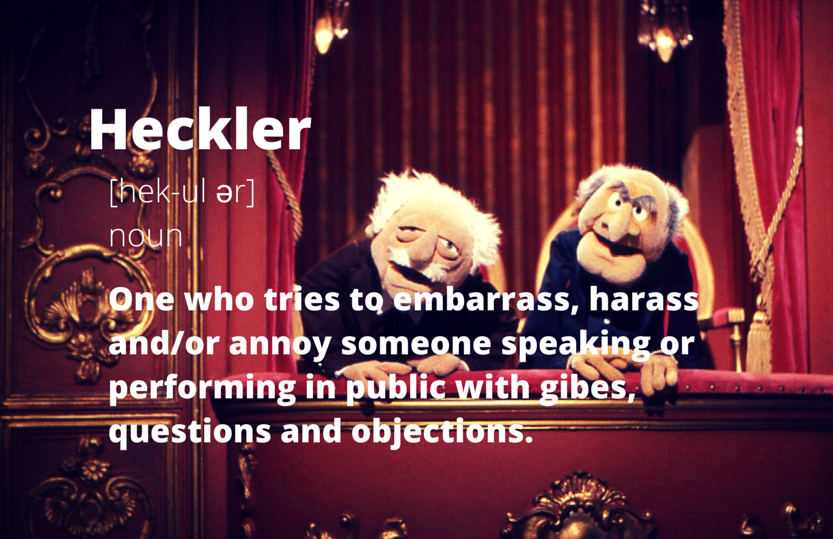

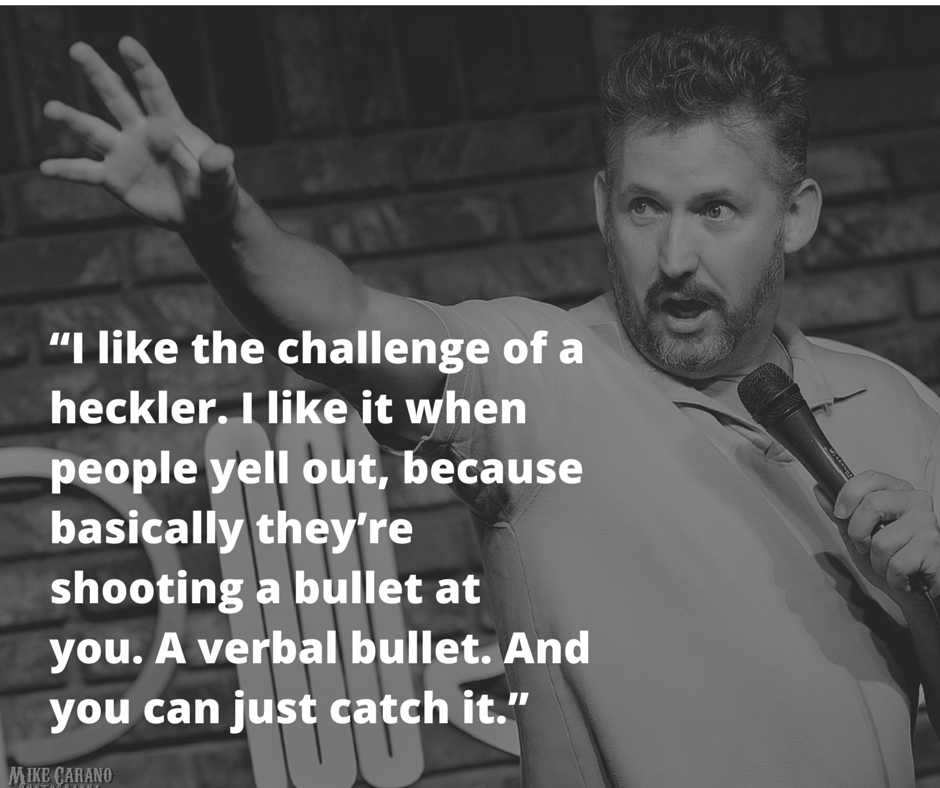
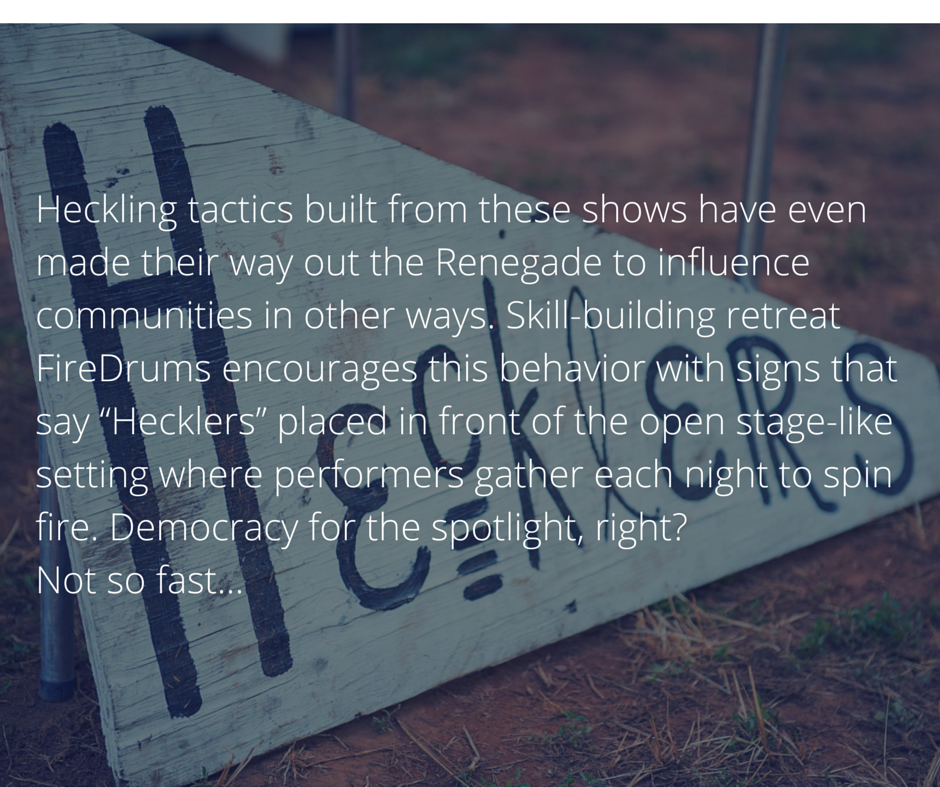
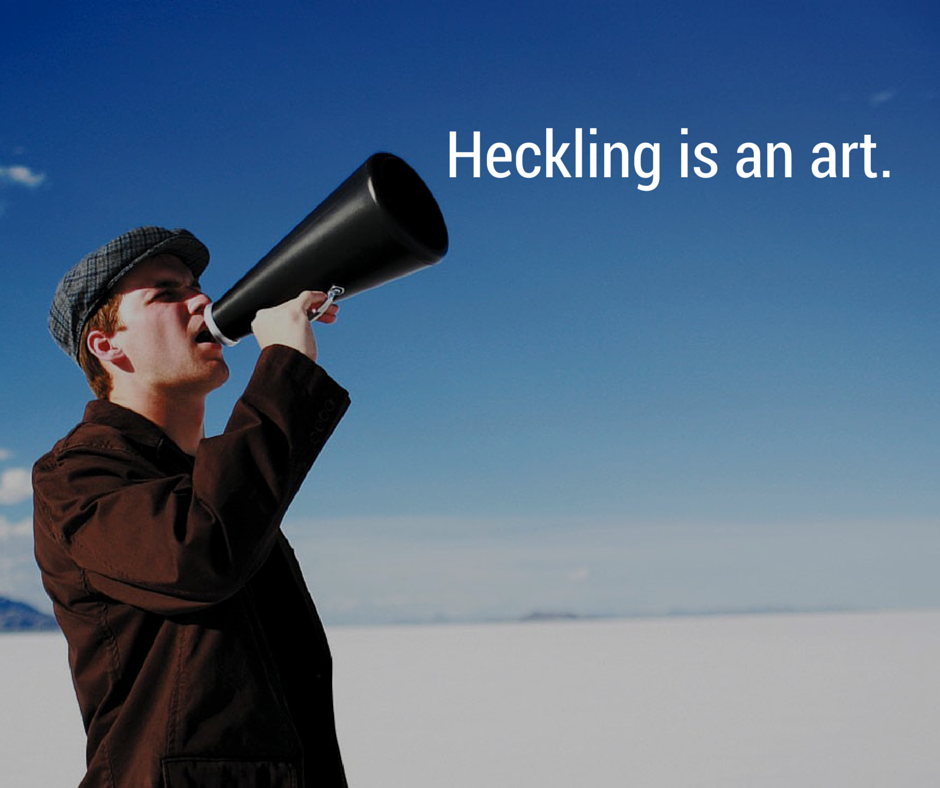
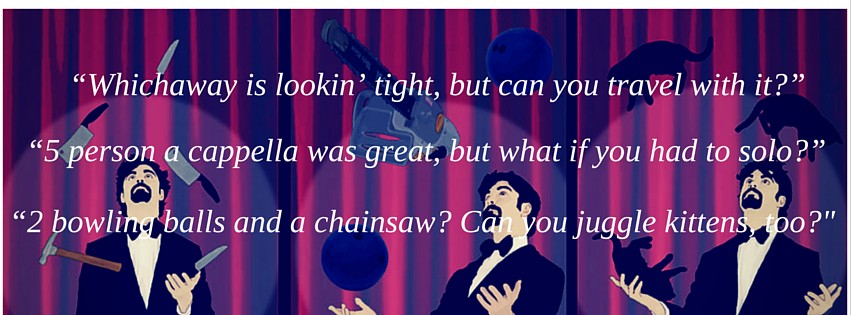
Comments 2
Take off your pants!! Oh wait… I feel the need to clarify a few points:
We were more than happy (and have done so on many occasions) to remove our clothing.
It was a joke between friends yelled at other friend who were in on the joke… Well, mostly.
If you truly found it obcene, I wish you would have engaged us (or any offending party) in a dialogue. Maybe then the true spirit behind the phrase would have been apparent.
Until such a time, please keep your pants ON.
I recently had “Take your fucking pants off!” directed at me while spinning fire at a music festival. At the time, I didn’t think of it as you describe in that I’d failed a number of times and owed the audience more, but I will say that getting naked mid-spin had the effect of boosting my confidence and easing my nerves. As someone who is often self-conscious when performing in front of ‘better’ spinners, the fact that I was naked made me feel like my spinning was no longer the spectacle – it was now “hey look at that naked guy” and this provided a comfortable container in which to express myself. I spun out in dramatic fashion, roared at the crowd “Are you not entertained?!”, and someone ran up to give me a dollar. A+, would be heckled again.